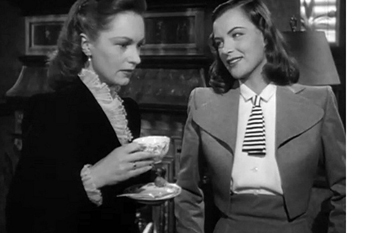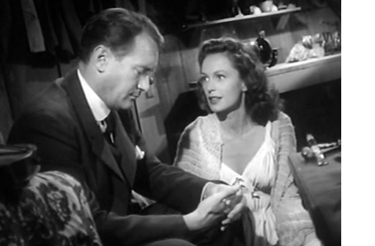
 |
|
|
|
Robert Siodmak's The Strange Affair of Uncle Harry is one of those odd movies that should have been a celebrated classic. It's a perfect little picture of its kind, with impressive performances and an intriguing theme. But it couldn't find its way around a censorship problem. Its unsatisfactory final scene was immediately rejected by critics, audiences and its own producer -- who quit her studio in protest. Rarely revived, Uncle Harry was once a late night TV staple, in ever-worsening prints. Republic Home Video's own VHS tape from the 1990s was no winner. Now the film is back on Blu-ray and DVD in great shape, yet presenting more of a mystery than ever. Siodmak and his producer Joan Harrison were on a roll with Uncle Harry, having already come from behind with a terrific noir sleeper hit in 1944's Phantom Lady. Formerly Alfred Hitchcock's production secretary, Harrison had contributed to the scripts of Jamaica Inn, Rebecca, Foreign Correspondent, Saboteur and most notably for this project, Suspicion. Thomas Job's original play entertains a taboo theme, incest. The middle 1940s were rife with psychology-based thrillers, but Uncle Harry is one of the best.
New Hampshire textile designer Harry Melville Quincy (George Sanders) takes care of his sisters, middle-aged widow Hester (Moyna MacGill) and the younger unmarried Lettie (Geraldine Fitzgerald), a needy hypochondriac. Lettie is far too attached to Harry. She mistreats Hester and monopolizes Harry's attention, so much so that she buys poison for him to
The Strange Affair of Uncle Harry is an impressive little movie. George Sanders specialized in self-satisified, often cynical characters, but he's extremely effective as a gentle man easily manipulated by the women in his life. Hester mourns her late husband and trades in gossip, and frequently argues with the astonishing Lettie, one of the most venomous female characters of the 1940s. The unsung Geraldine Fitzgerald makes Lettie coarse and dismissive of her sister, while treating Harry with exaggerated affection. She's always on the lookout for any sign that his attention is turning elsewhere. Harry wastes too much time with concern for a dog? Bye bye Fido. When the self-possessed Deborah arrives, Lettie hides her rage behind genteel manners and compliments. What Uncle Harry most resembles is an episode of the later Alfred Hitchcock Presents TV series: the civilized drawing room atmosphere, the intimate family politics. The high quality of the characterizations and acting can't disguise the obvious planting of a bottle of poison, "absolutely painless" as would become a pointed line of dialogue in the later Psycho. The movie followed close behind Billy Wilder's Double Indemnity, a study of cold-blooded murder which opened the Production Code doors to a broader range of sordid themes. Although not made a physical reality, the veiled incest in Harry is entirely credible. The mystery of the film's production is why and how producer Harrison and Universal got themselves into a situation where (reportedly) five endings were filmed, with the studio choosing the final based on the reaction of preview audiences. Nobody likes the one that ended up on the movie, but we no longer know what the alternates were, or what the Breen Office objected to in Harrison's desired ending (if there was one). To go further, I'll need to step deep into the Spoiler Zone, even though almost everything else written about The Strange Affair of Uncle Harry gives away the finish in complete detail.

Do not read further if you do not wish The Strange Affair of Uncle Harry spoiled. The chosen final ending is basically a replay of the conclusion of Fritz Lang's then recent The Woman in the Window. In that movie Edward G. Robinson innocently implicates himself in a murder cover-up. When convinced his arrest is imminent, it is suddenly revealed that what we've seen before has been a dream ever since the first reel, when Robinson took a nap in his men's club. His dream was suggested by a painting of an alluring woman that caught his (guilty) imagination. The classic noir focuses on the hidden desires of a middle-aged man and is thus one of the few satisfying thrillers with an "it was all a dream" structure. In Uncle Harry the dream explanation is crudely tacked on. Continuity-wise, the 'dream' begins right after Harry discovers that Lettie has deliberately sabotaged his romance: the frustrated Deborah has left with another man, and reportedly married him in New York. Harry's actions, supposedly part of his dream, are not very dream-like. He quietly arranges for the maid Nona (Sara Allgood) and the druggist (Harry Von Zell) to be made aware of the fact that Lettie purchased the poison; he even discovers that Lettie may have poisoned the dog, and only let Harry think it had died of natural causes. 1 Harry prepares the poisoned tea, but a mix-up occurs and the innocent Hester dies (and not altogether painlessly). Lettie understands immediately what has happened and Harry is horrified by his mistake. But it makes no difference. All Harry must do is remain mum, for both the evidence and Lettie's well known hatred of Hester will doom her to the gallows. At the last moment Harry goes to the warden, but his confession is not believed. Calmly accepting her fate, Lettie refuses Harry's (true) confession as well. Now that he's betrayed her she has nothing to live for. Her only pleasure is knowing that her brother, now totally alone, will be consumed by guilt when she's gone.
If The Strange Affair of Uncle Harry ended there, it would be very similar to Fritz Lang's next film, the haunting Scarlet Street with its horror-vision of Edward G. Robinson doomed to wander the New York sidewalks, hearing the mocking voice of the woman he
In the 'dream' ending Deborah suddenly reappears, unmarried, to whisk Harry away. The murder never occurred and Hester is alive and happy. The lovers leave, all smiles. Contemporary reviewers voiced dissatisfaction with Ella Raines' performance, when she's really perfect, the 'outside woman' who threatens to disrupt the life of a man set in his ways. I think they were really reacting to the gross inconsistency of the dream finale. What we know about Harry doesn't augur well for his leaving his New Hampshire backwoods town -- he's passive and unassuming to such a degree that he's unaware when women are dictating his feelings and actions. He could easily get sick of competitive, cynical New York. If he doesn't 'bloom' in the big city, Deborah will surely become bored and dump him. All in all Sanders' Harry Quincy is very much a Hitchcock character. Harry is a believable mild everyman, neither a milquetoast nor a maniac, but an ordinary guy who kills. That's a perfect Hitchcock hero, the kind that showed up in every second episode of Alfred Hitchcock Presents. Make Harry younger and Lettie his mother, add a jolt of murderous madness, and you have a prequel to Psycho. 2 I'm not sure what Joan Harrison and Robert Siodmak's intended ending was for Uncle Harry but I assume it would have left Harry alone and guilty, cursed by his own sister as if she were a Salem witch going to the stake. Geraldine Fitzgerald's gallows triumph is truly impressive, much more than a stunt or twist ending -- her parting smile reminds us of the skull-curse ending of Psycho, too. 
The galling thing about The Strange Affair of Uncle Harry is that the Breen Office was apparently oblivious to Lettie's unhealthy attraction to / possessiveness of her brother Harry. Her repressed desire -- the source of her sociopathic meddling -- practically jumps out at us, yet is not overdone. Harry marked two times at bat that Joan Harrison had experienced criminal censor interference. As one of the writers of Suspicion, she surely relished that film's original, diabolical ending, which would have made the best Hitchcock TV twist stinger ever. But Uncle Harry must have been more painful, as a potentially great thriller was ruined. 3 A couple of parting casting notes: I watched the excellent actress Moyna MacGill for a few minutes and thought to myself, she could be the mother of Angela Lansbury... and that's exactly who she is! Same mouth and chin. And the town's local gossip is none other than our beloved Ethel Griffies, one of the funny drunk ladies from the ancient WereWolf of London (1935). More importantly for our Alfred Hitchcock connections, twenty years later and quite a few pounds lighter, Ms. Griffies is the delightful 'Bird Lady', the ornithologist in the maestro's sci-fi shocker The Birds. Olive Films' Blu-ray of The Strange Affair of Uncle Harry is a clean and sharp encoding of this fascinating picture, decent copies of which have evaded film lovers forever. I'm told (correct me if I'm wrong) that a 16mm copy had to be sourced for showings at the American Cinematheque. As with most Olive transfers the scan is careful, but no cleanup has been done. The images are in great shape with a few speckles showing through from time to time. I only noticed them in the dark scene when Harry was showing Deborah the rings of Saturn in his telescope. No extras are included. Olive's cover artwork is probably well chosen: would buyers respond to the sedate still images associated with the picture? Nobody so much as raises a fist in this civilized, yet psychologically violent movie. 
On a scale of Excellent, Good, Fair, and Poor, Footnotes:
1. The way things are in our present millennial culture, the film's potential dog-icide overrides any other moral concern: Lettie Quincy Must Die. I have friends and relatives that will not watch a movie if they're told that harm to a dog is involved. 2. The Strange Affair of Uncle Harry has the same murder formula as Hitchcock's Dial M for Murder. A man plots a murder. The intended victim kills a third party instead, so the man successfully frames the intended victim for that killing. Although the role of the poison is a lumpen cliché, Harry is more concerned with human relationships than with mystery plot mechanics.
The only other movie with a character similar to George Sanders' Uncle Harry is William Hurt's reclusive author in The Accidental Tourist, bouncing passively between the more benign domination of strong women.
3. The terrific unused ending to Suspicion is fully explained in the great Truffaut/Hitchcock book, and a million other places. I discuss it in my review as well.

Reviews on the Savant main site have additional credits information and are often updated and annotated with footnotes, reader input and graphics.
Review Staff | About DVD Talk | Newsletter Subscribe | Join DVD Talk Forum |
| ||||||||||||||||||